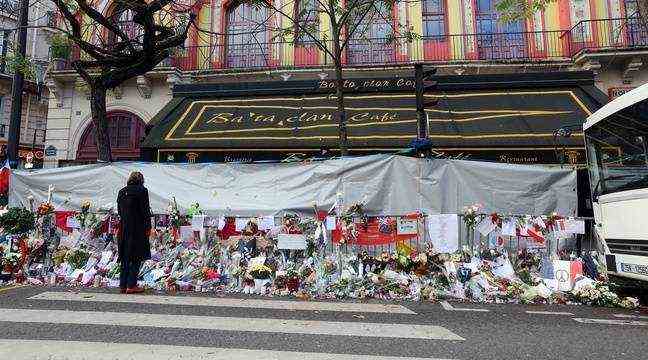It was a Friday like any other. That evening, Camille and her husband had invited members of their family to come and have a drink. Their youngest daughter was in bed, the eldest, then two and a half years old, had watched beyond the traditional bedtime schedule. “Suddenly, we heard a loud noise, like firecrackers,” remembers the thirty-something. Almost by reflex, she sticks her head out the window and sees, in the Amelot passage, in the heart of the 11th arrondissement of Paris, two “guys armed up to their necks” shoot at point blank range at passers-by before rushing into the concert hall located in front of their apartment: the Bataclan. They are in reality three terrorists, but this, Camille will discover it the next day, November 14, 2015, in the press.
“We imagined what was happening”
If she has never considered herself a victim, even indirect, of the attacks whose trial opens on Wednesday, the young woman was deeply marked by this evening. To the point of moving, less than a year later. “We made the decision in a few weeks,” she recalls. Everything about us reminded us of that evening, we couldn’t get out of it. For several hours, the gusts of Kalashnikovs vibrated the floor, walls and windows, to the point of breaking several pipes. “It was extremely impressive. Even if we didn’t see anything, we imagined what was happening, we projected ourselves. “
After the attacks, the family tries in vain to find their marks, but the stigmata of that night are everywhere. Starting with their building, where a man died, hit by a stray bullet. As for their neighborhood, so lively until then, it has become a place of contemplation. “We felt like we were living next to a grave. People were putting down flowers, candles. It’s normal, but it’s not easy, when it’s downstairs. Most of their neighbors will also set sail.
Isolated case or wave of moves?
How many are there in this case, to have left, after the attacks, the 10th and 11th arrondissements, where the Bataclan and the bruised terraces were located? Impossible to say. INSEE, which carries out the population census, calculates the migratory balance – that is to say, the difference between departures and arrivals – over five rolling years. It is therefore impossible to isolate figures for the years 2016 or 2017 alone. According to the organization, however, if the population of this district has been declining since 2012, no acceleration has been observed in the years following the attacks.
The calculation is all the more complicated as not all moves are necessarily linked to the attacks. And, even when this is the case, some families have chosen to stay in the area. Camille and her family, for example, still live in the 11th arrondissement but in the Charonne district… a stone’s throw from the bar La Belle Equipe, also targeted by terrorists. “The difference is that we have not lived it, we do not have the memories of that evening in this apartment. “
For Dorothée *, these attacks only accelerated an idea that began to germinate in the summer of 2014, after the violence in front of the synagogue on rue de la Roquette. “We are not particularly religious, but it marked us. »A few months later, the attack on Charlie hebdo. They who live on Boulevard Parmentier, walk past the headquarters of the weekly every day to drop their daughter off at the crèche. Then the attacks of November 13. “We love the 11th arrondissement, for me it’s the archetype of Parisian life, with all the communities that live together. But we no longer felt safe there, especially with a small child. The climate has become anxious, impossible to walk a few meters without running into a Sentinel patrol. These heavily armed soldiers are present in front of nurseries and schools. “It’s understandable, but it was too much. When I was 3, my daughter started asking us questions about the attacks. »At the end of 2016, when the young woman becomes pregnant with their second child and the apartment becomes too cramped, they seize the opportunity and move to the north-west of the capital.
Leave Paris
Jacques now lives in Nantes. The sixty-year-old however immediately recognizes it: before November 13, he had never heard of the Bataclan or frequented one of the terraces targeted that evening. “I’m too old for those bars, they were places for young people,” remembers the man who then lived 100 or 150 meters from Carillon and Petit Cambodge. He too heard the sound of what he first thought were firecrackers. But it was screams that decided him to pause the movie he was watching to go and take a look out the window. “I went down to see if I could help, but almost immediately turned around. I am an engineer, I know nothing about first aid and the firefighters were coming. “
Once the shock of the attacks has passed, Jacques and his wife gradually regain their life, in this district where they have lived for more than twenty years. The same traders, the same routine, but not the same serenity. “It’s hard to explain, but something had changed. Or maybe it was from us, from our perception. As they walk past a bar, the couple can’t help but imagine the “worst”. However, for two years, the idea of moving did not cross their minds. And then, to go where? Finally, in 2017, everything accelerates, their son moves, Jacques’s wife retires and the idea of leaving the capital becomes obvious. “Would we have made the decision to leave without the attacks?” I’m not sure of it. Not so quickly, anyway. “

